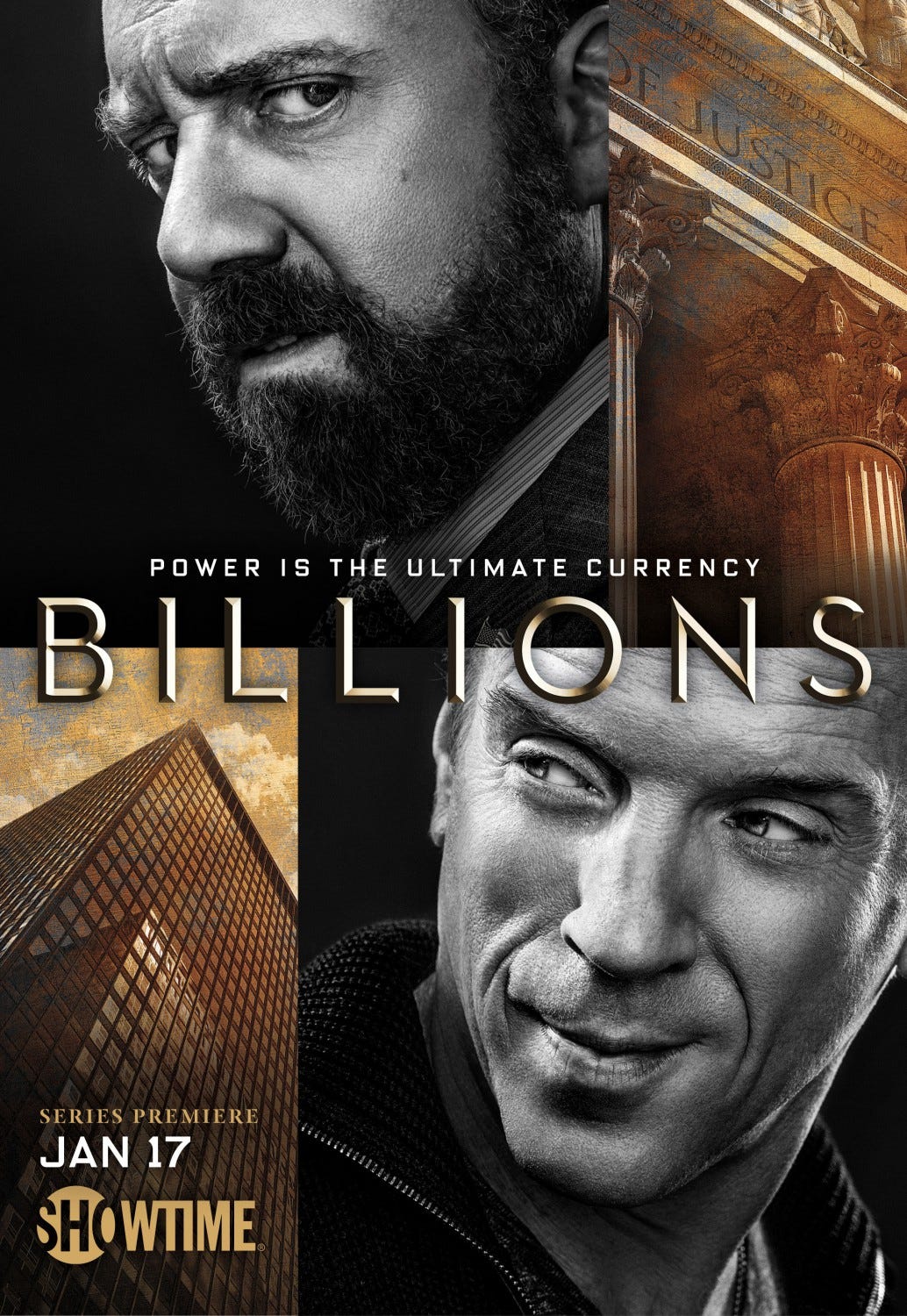Billions: A Personal Perspective part 1
damned good dialogue
Over the next few weeks, I'll be writing about the show "Billions" through a three-part series. Part retrospective, part love letter, these posts aim to express my deep admiration for the show.
I
Billions is a revelation. From the first episode, I was addicted. The characters, the plot twists, the dialogue – they all got me hooked. It raised the bar for intelligent storytelling. Heck, it changed how I think about the world. With its high-stakes drama, sharp writing, and captivating characters, Billions stands out in this golden age of television.
Set against the backdrop of high finance and federal law, Billions dives into a world of power struggles and relentless ambition. The cloak-and-dagger between Chuck Rhoades, the tenacious US attorney played by Paul Giamatti, and Bobby Axelrod, the equally relentless hedge fund manager portrayed by Damian Lewis, drives the series' narrative.
The show’s excitement comes with these characters getting the edge over the other in a game of 4D-chess, and they derive a great deal of satisfaction from outmaneuvering their enemies. Each season delivers a roller coaster ride of suspense and usually ends on a satisfying note.
II
Beyond the gripping plot lines and intense performances, there's something else that sets Billions apart: its impeccable dialogue writing. Be it one-liners, monologues or back-and-forth.
One-liners:
We have to be more pure than the Virgin Mary before her first period.
Cultural references:
Orrin: In depositions. I've seen things you wouldn't believe.
Axe: Attack ships on fire?
Chuck Rhoades’ great speeches:
The dialogue in Billions is stylized, injecting the series with a heightened sense of reality and gravitas. It gives the show its identity.
There’s a rhythm and structure to the show’s dialogue, which actor Paul Giamatti admits the dialogue were difficult to memorize and so dense that the cast had to spend a lot of time working on it.
One example is when Axe (over)simplifies the roles of bankers:
Axe: You know what they call us traders? "Gamblers". The world economy is just one big casino fueled by a giant debt bubble and computer-driven derivatives. There's only one thing better than being a gambler at a casino.
Wags: That's being the house.
Axe: That is right. There's a systemized machine out there sucking capital from localities and injecting it into the global markets where it can be used to speculate and manipulate. And if something goes wrong, there are bailouts, bail-ins, federal aid and easing. Where the government doesn't hunt you down, but instead gives you a nice soft net to land in.
Whew. What a mouthful. But that’s a hallmark of the show.
The dialogue not only gives substance and depth to the characters but also adds richness to the world they inhabit. Yet, despite the sophistication inherent in its subject matter, Billions never veers into pretentiousness. It doesn’t take itself that seriously at all.
"What's The Point Of Having F*** You Money, If You Never Say, 'F*** You'?"
That’s part of the show’s charm.
III
The writing of Billions is nothing less than extraordinary. It's a testament to the skill and creativity of the writers that they can craft dialogue that is both intellectually stimulating and endlessly entertaining.
However, the writing and dialogue, no matter how good, cannot carry the show on their own. They need the performance and delivery from the cast, which I’ll discuss in next week’s post.
Read
Two pieces I read this week reminded me that life’s short, we need to keep that in mind at all times.
Nothingness of Money - let’s not wait until we’re on our deathbeds to figure out what’s important.
The Tail End - a 90 year life only has 90 summers left. That’s not a lot.
Watch
Everything Everywhere All at Once
It’s the Lunar New Year, and EEAAO’s the only film in recent memory that’s set around the holiday. Great film!
Listen
Freakonomics has a special on Richard Feynman!
Find me on twitter @ RaketheGates


